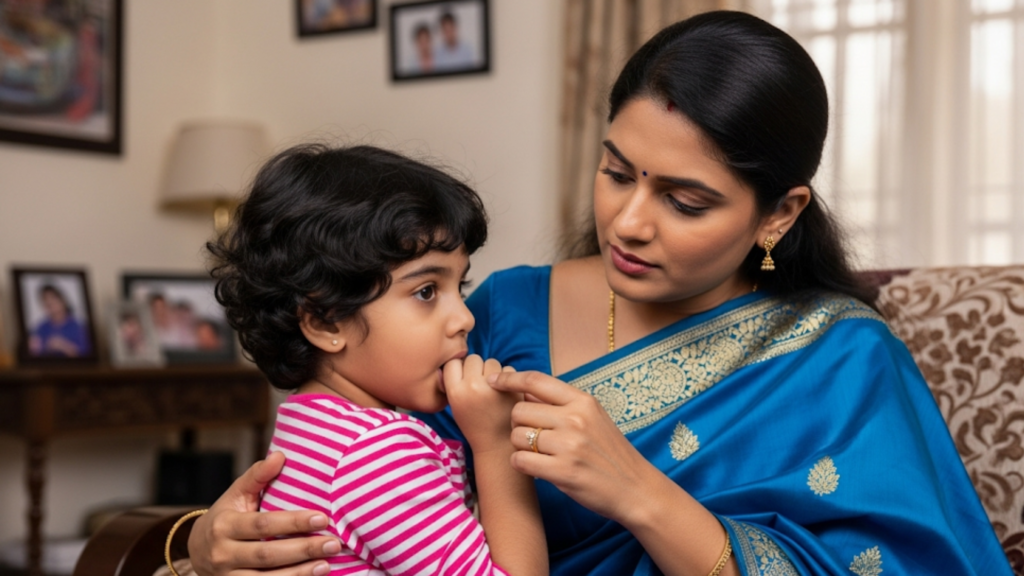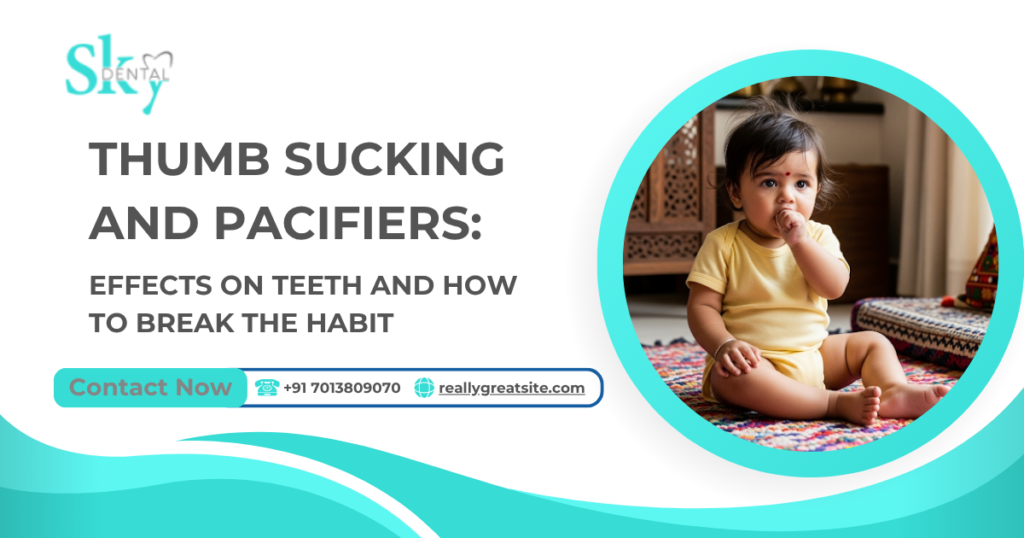Thumb Sucking and Pacifier habits that are observed in kids are quite normal and are largely regarded as harmless during early childhood. They are helpful to make a baby feel safe, relaxed, and even sleep better. However, these habits may impact the oral health of the child when the child grows past the toddler stage and still has these habits.
In this blog, we will find out how thumb sucking and pacifier affect the teeth and what the parents can do to wean off the habit in a gentle manner.

Why Do Children Suck Their Thumbs or Use Pacifiers?
Newborns are born with the sucking reflex. It begins way before birth. They are thumb suckers, or pacifier users, as a result of which they feel safe, relaxed, and comforted.
The habit is self-expressed in most children between the ages of 2-4. But when the habit persists after this age, it may give rise to problems with the teeth.
Effects of Thumb Sucking and Pacifier Habits on Teeth
Continued sucking of fingers and pacifier (especially following the eruption of permanent teeth at age 6) may cause:
- Misaligned Teeth:
Sucking has the force that expels teeth. It can provoke the development of unhealthy conditions such as overbite and open bite, as well as crookedness of the teeth. - Jaw Shape changes:
Prolonged sucking may interfere with the development of the upper jaw and the contour of the roof of the mouth. - Speech Issues:
Teeth and the structure of the mouth changes may cause some children to develop speech problems like lisping. - There is an Enhanced Risk of Infections:
Hands or pacifiers dipped in dirt are likely to contain germs, thus putting the mouth at a higher risk of infection or stomach-related conditions.
When Should Parents Be Concerned?
When your child is over 3 or 4 years of age, still sucking his/her thumb or using a pacifier, it is time to begin to help him/her quit the habit. The sooner you do it, the less you will find it difficult to avoid a dental problem.

How to Help Your Child Break the Habit
Here are a few general and useful ways to stop thumb sucked and pacifier use amongst children:
- Positive Reinforcement:
When your child does not suck his/her thumb, praise the child. To push developments, offer minor rewards such as stickers or stars. - Identify Triggers:
There are instances when some children suck their thumbs when they are bored, anxious, or tired. Attempt to find these triggers and provide relief or distractions. - Abusive Parents Keep Their Hands Busy:
Give them toys, fluffy blankets, or stress balls to do something with their hands. Sucking is reduced when the fingers of the baby are occupied. - Limits Should Start Small:
In case your child is using a pacifier, make sure that usage is only during bedtime or during naps. Gradually decrease the amount of usage by the week. - Start a Bedtime Program:
In many cases, the children suck their thumbs at bedtime. The stories or music bedtime routine can be used to help them sleep without developing the need to do the habit. - Speak to a Pediatric Dentist:
In case the habit is intense, seek the services of a child dentist. They can advise you on habit-breaking appliances or counseling support.
Be positive and understanding
It takes time to stop the thumb sucking and pacifier habits among children. Do not make fun of your child or punish him for it. Rather, be loving and supportive and softly encouraging. Bear in mind that each child is unique. Others can quit the habit within a short period, and some others may take longer. The trick is to always be cool and steady.
Conclusion
Although thumb sucking and the use of pacifiers are normal during early childhood, long-term habits can harm the health of your child when it comes to dental problems. As a parent, it is quite important to know the impact and the ways of helping your child to stop smoking.
Visit Sky Dental for expert pediatric dental care and personalized advice. Our friendly team is here to help your child build healthy habits in a safe, stress-free environment.


